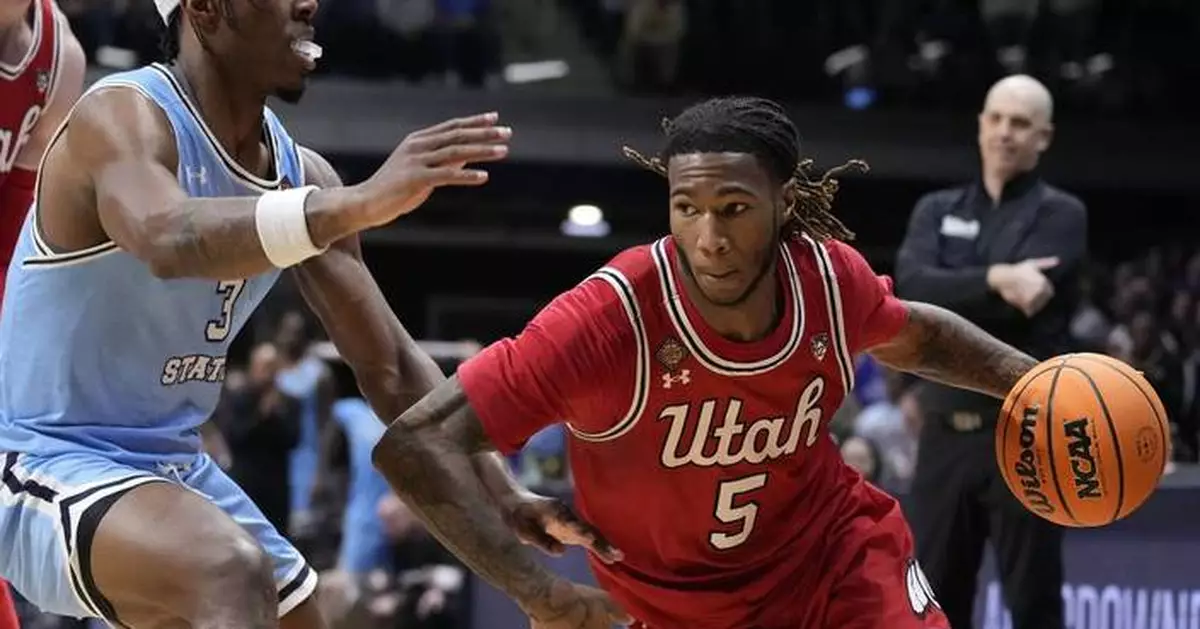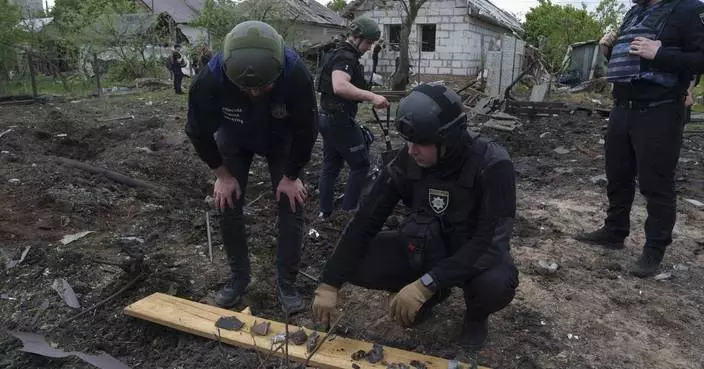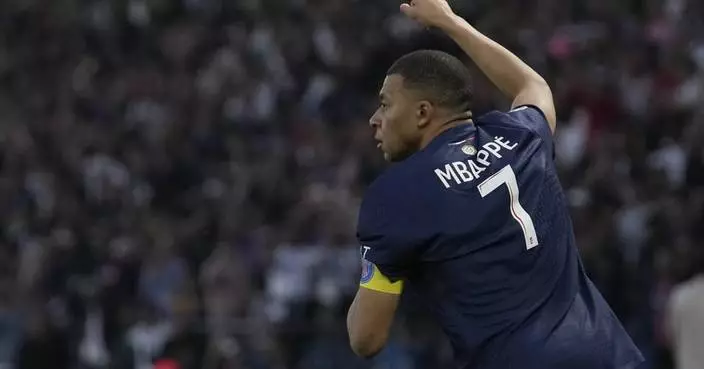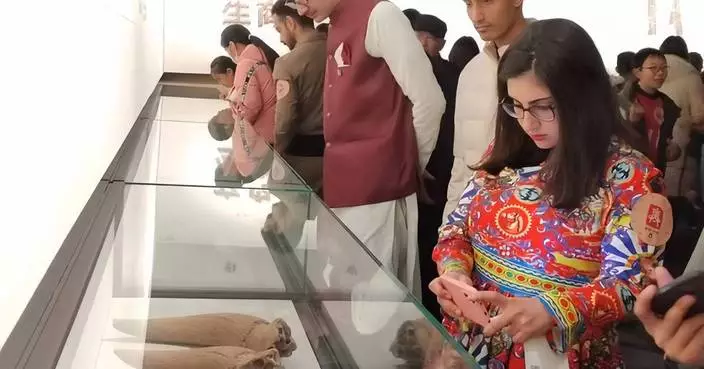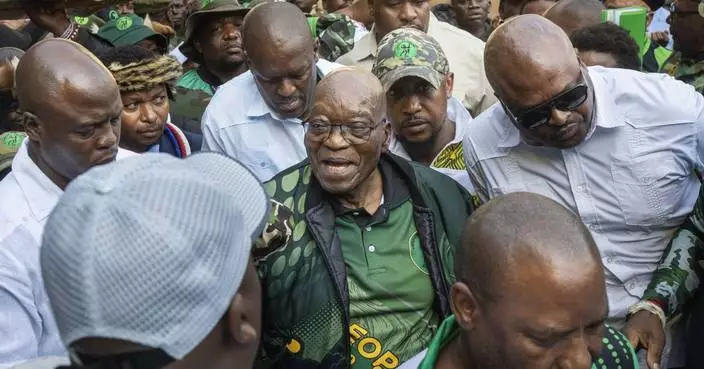Point guard Deivon Smith is transferring to St. John's from Utah, giving Hall of Fame coach Rick Pitino a veteran replacement for Daniss Jenkins next season.
A fifth-year senior, Smith ranked sixth in the country with 7.1 assists per game last season. He averaged 13.3 points and 6.3 rebounds for the Utes, compiling five triple-doubles — second most during a single season in NCAA history and the most by any Pac-12 player.
In a St. John's news release Monday, Pitino said the 6-foot Smith reminds him of Miami Heat guard Terry Rozier, a standout player for Pitino at Louisville.
“Super excited to have Deivon Smith joining the Johnnies,” Pitino said. “Total dog who rebounds, creates, and scores.”
Smith, from Decatur, Georgia, played his freshman season at Mississippi State and then spent two years with Georgia Tech. He shot a career-high 46.7% from the field in 28 games during his only season at Utah.
Two of his triple-doubles came during Utah's run to the NIT semifinals, and he scored a career-best 28 points against tournament runner-up Indiana State on April 2.
Smith becomes the third notable transfer the Red Storm have landed this offseason, joining 7-foot-1 center Vincent Iwuchukwu from USC and 6-foot-7 forward Aaron Scott from North Texas. They both committed last month.
At point guard, St. John's also returns sophomore Simeon Wilcher, a touted recruit who began to show marked improvement late last season in his limited role as a freshman. Wilcher averaged 2.8 points and 9.1 minutes in 28 games as Jenkins' understudy.
Jenkins followed Pitino from Iona to St. John's for his senior season and propelled the Red Storm to a 20-13 record, including 11-9 in conference play for their most Big East wins in 14 years. They reached the Big East Tournament semifinals for the first time since 2000, losing 95-90 to eventual NCAA champion UConn.
Jenkins led the team in scoring (14.9 points per game), assists (5.4), steals (1.6) and minutes (30.7), earning second-team all-Big East honors.
AP college basketball: https://apnews.com/hub/ap-top-25-college-basketball-poll and https://apnews.com/hub/college-basketball

FILE - St. John's head coach Rick Pitino looks on during the first half of an NCAA college basketball game against Stony Brook, Nov. 7, 2023, in New York. Point guard Deivon Smith is transferring to St. John’s from Utah, giving Hall of Fame coach Pitino a veteran replacement for Daniss Jenkins next season. (AP Photo/Seth Wenig, File)

FILE - Utah guard Deivon Smith (5) drives past Indiana State guard Ryan Conwell (3) in the second half of an NCAA college basketball game in the semifinals of the NIT, April 2, 2024, in Indianapolis. Smith is transferring to St. John’s from Utah, giving Hall of Fame coach Rick Pitino a veteran replacement for Daniss Jenkins next season. (AP Photo/Michael Conroy, File)
TAIPEI, Taiwan (AP) — In a campaign ad for Taiwan’s President-elect Lai Ching-te, incumbent President Tsai Ing-wen was shown driving with Lai in the passenger seat, exchanging reflections on their years governing together. Tsai later turned over the driving to Lai, who was joined by running mate Bi-khim Hsiao.
The message was clear: Lai would steer the island in the direction set by Tsai, who after eight years in power was barred from running again.
Lai, 64, will take office Monday. Continuing Tsai’s legacy means aiming to strike a balance between cultivating Taiwan’s unofficial alliance with the United States and maintaining peace with China, which claims Taiwan as its own territory, to be retaken by force if necessary.
Lai is also expected to build on some of Tsai’s domestic reforms, despite political gridlock. Lai and Tsai’s Democratic Progressive Party has lost the majority in the legislature, making it hard for Lai to push through legislation, including the approval of crucial national defense budgets.
Tsai, 67, has been Taiwan’s first female president and one of Asia’s few female leaders who didn’t hail from a political dynasty. Her legacy will be tied to defending the island’s sovereignty from China while refashioning it as a credible partner for the U.S. and other democracies. She will also be remembered for overseeing the legalization of same sex-marriage, steering Taiwan through the COVID years and kickstarting the island’s military modernization.
She leaves office with high approval ratings. A recent poll by broadcaster TVBS showed 42% of respondents were satisfied with her eight-year performance. Her predecessor, Ma Ying-jeou, left office with approval ratings of around 23%.
Tsai’s popularity partly reflects a shift in Taiwan’s identity. A vast majority of residents now identify as Taiwanese as opposed to Chinese and want to be governed separately from Beijing. Taiwan and China have had different governments since a civil war in 1949 saw the Nationalists flee to the island while China’s Communist Party took control of the mainland.
Tsai veered from the more China-friendly policies of the previous ruling party, the Kuomintang. By the end of Ma’s tenure, the frequent exchanges with Beijing were making many Taiwanese nervous, said Shelley Rigger, a Taiwan expert at Davidson College.
Beijing called Tsai a separatist after she refused to acknowledge the 1992 Consensus, an agreement which says Taiwan is part of “One China.” While pulling away from Beijing, however, Tsai left a door open for communication.
“President Tsai has always said that Taiwan, under her leadership, is happy, willing and eager to have dialogue with Beijing, just not on terms unilaterally imposed by Beijing,” said Wen-Ti Sung, a fellow with Washington-based think tank Atlantic Council.
China has not only declined to speak to Tsai but also ramped up military and economic pressure on the island, sending warships and military jets near it daily.
Beijing prevents countries it has diplomatic relations with from having formal ties with Taipei. During Tsai’s tenure, it intensified a campaign to lure away the island’s few diplomatic partners. During Tsai’s years in office, China poached almost half of Taiwan’s diplomatic allies, bringing the remaining number to 12.
Tsai pushed back by diversifying trade relationships and increasing military spending including submarine development. She also elevated Taiwan’s standing on the international stage, said outgoing Foreign Minister Joseph Wu.
“Her leadership style is very moderate, but at the same time very firm in dealing with any kind of international pressure,” he said.
“She strengthened awareness of Taiwan around the world and its ties with the international community,” said Bonnie Glaser, the director of the Indo-Pacific program at the German Marshall Fund of the United States.
Lai, who served as vice president during Tsai's second term, came across as more of a firebrand earlier in his career. In 2017, he described himself as a “pragmatic worker for Taiwan’s independence,” drawing Beijing’s rebuke. He has since softened his stance and now supports maintaining the status quo across the Taiwan Strait and the possibility of talks with Beijing.
“Lai has spent the last two-plus years trying to convince the world that he is Tsai Ing-wen 2.0,” said Lev Nachman, an assistant professor at National Chengchi University.
Lai will build on Tsai’s efforts to strengthen ties with the U.S., which doesn’t formally recognize Taiwan as a country but is bound by its own laws to provide the island with the means to defend itself.
By some measures, Lai’s greatest uncertainty on the foreign policy front might come from Washington. A new Donald Trump administration could throw off whatever balance Tsai has achieved in Taipei’s relations with Washington and Beijing, Nachman said.
During Tsai's tenure, Taiwan became the first society in Asia to legalize same-sex marriage, though critics say she skirted political responsibility by leaving the decision up to the Supreme Court and a series of referendums.
She oversaw a controversial pension and labor reform and extended the military conscription length to one year. She also kickstarted a military modernization drive, including a program for building indigenous submarines at more than $16 billion each.
Tsai’s leadership during the COVID pandemic split public opinion, with most admiring Taiwan’s initial ability to keep the virus largely outside its borders but criticizing the lack of investment in rapid testing as the pandemic progressed.
Tsai’s mixed success on the domestic policy front contributed to historically poor results for the DPP in local elections, said Sung with the Atlantic Council. The party’s poor performance in the 2022 elections led to Tsai resigning as party chairwoman. And while Lai won the presidential election, DPP lost its majority in the legislature.
“Much of President Tsai’s government’s success comes from the foreign policy and related international outreach fronts, and in terms of making inroads on the much more grassroots party machinery level, for example, those still have room for improvement,” Sung said.

A supporter of opposition Taiwan People's Party (TPP) holds a guava, symbolizing dishonored ballot during a march to protest against Lai Ching-te's ruling Democratic Progressive party a day before his presidential inauguration in Taipei, Taiwan, Sunday, May 19, 2024. TPP demands that Lai''s government must implement parliamentary, judicial and constitutional reforms. (AP Photo/Chiang Ying-ying)

Supporters of opposition Taiwan People's Party (TPP) stage a rally to protest against Lai Ching-te’s ruling Democratic Progressive party, a day before his presidential inauguration in Taipei, Taiwan, Sunday, May 19, 2024. TPP demands that Lai's government must implement parliamentary, judicial and constitutional reforms. (AP Photo/Chiang Ying-ying)

Supporters of opposition Taiwan People's Party (TPP) gather to protest against Lai Ching-te’s ruling Democratic Progressive party, a day before his presidential inauguration in Taipei, Taiwan, Sunday, May 19, 2024. TPP demands that Lai's government must implement parliamentary, judicial and constitutional reforms. (AP Photo/Chiang Ying-ying)

Supporters of opposition Taiwan People's Party (TPP) march to protest against Lai Ching-te’s ruling Democratic Progressive party, a day before his presidential inauguration in Taipei, Taiwan, Sunday, May 19, 2024. TPP demands that Lai's government must implement parliamentary, judicial and constitutional reforms. (AP Photo/Chiang Ying-ying)

FILE - Taiwan's President Tsai Ing-wen delivers a speech during the naming and launching ceremony of domestically-made submarines at CSBC Corp's shipyards in Kaohsiung, southern Taiwan, Sept. 28, 2023. Taiwan's president-elect Lai Ching-te is set to take office on May 20. Building on the legacy of incumbent president Tsai, Ing-wen means aiming to strike a balance between cultivating Taiwan's unofficial alliance with the United States, and maintaining peace with China, which claims Taiwan as its own territory, to be retaken by force if necessary. (AP Photo/Chiang Ying-ying, File)

FILE - In this photo released by the Taiwan Presidential Office, Taiwan's President Tsai Ing-wen, speaks at a luncheon during a visit by a Congressional delegation to Taiwan in Taipei, Taiwan, April 8, 2023. Taiwan's president-elect Lai Ching-te is set to take office on May 20. Building on the legacy of incumbent president Tsai, Ing-wen means aiming to strike a balance between cultivating Taiwan's unofficial alliance with the United States, and maintaining peace with China, which claims Taiwan as its own territory, to be retaken by force if necessary. (Taiwan Presidential Office via AP, File)

Supporters watch an ad showing then Taiwan Democratic Progressive Party (DPP) presidential candidate Lai Ching-te in a car driven by incumbent president Tsai Ing-wen during a rally held in New Taipei, Taiwan, on Saturday, Jan. 6, 2024. In the campaign ad, Taiwan's president-elect Lai Ching-te and incumbent president Tsai Ing-wen was shown driving steadily on the island's roads with Lai in the passenger seat, exchanging barbs and reflections on their years governing together. (AP Photo/Ng Han Guan)

FILE - Taiwan Democratic Progressive Party (DPP) presidential candidate Lai Ching-te, who also goes by William, is greeted by supporters during an election canvass of a neighborhood in Taoyuan, Taiwan, Jan. 11, 2024, ahead of the presidential election. Lai Ching-te is set to take office as Taiwan's new president on May 20. Building on the legacy of incumbent president Tsai, Ing-wen means aiming to strike a balance between cultivating Taiwan's unofficial alliance with the United States, and maintaining peace with China, which claims Taiwan as its own territory, to be retaken by force if necessary. (AP Photo/Louise Delmotte, File)

FILE - Taiwanese Vice President Lai Ching-te, also known as William Lai celebrates his victory after Taiwan's presidential election, in Taipei, Taiwan, Saturday, Jan. 13, 2024. Lai Ching-te is set to take office as Taiwan's new president on May 20. Building on the legacy of incumbent president Tsai, Ing-wen means aiming to strike a balance between cultivating Taiwan's unofficial alliance with the United States, and maintaining peace with China, which claims Taiwan as its own territory, to be retaken by force if necessary. (AP Photo/Chiang Ying-ying, File)




